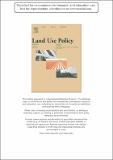| dc.contributor.author | Kindermann, Gesche | |
| dc.contributor.author | Gormally, Michael | |
| dc.date.accessioned | 2013-05-08T10:25:04Z | |
| dc.date.available | 2013-05-08T10:25:04Z | |
| dc.date.issued | 2013 | |
| dc.identifier.citation | Gesche Kindermann, Mike Gormally (2013) 'Stakeholder perceptions of recreational and management impacts on protected coastal dune systems: A comparison of three European countries'. Land Use Policy, 31 :472-485. | en_US |
| dc.identifier.issn | 0264-8377 | |
| dc.identifier.uri | http://hdl.handle.net/10379/3390 | |
| dc.description.abstract | Coastal dune systems are particularly susceptible to destabilisation
through recreational pressure and because of this, conflicts frequently arise
between those who want to use the dunes for recreational purposes and those who
wish to see these fragile ecosystems protected. In addition, a range of
approaches to resolving this conflict are being used in different countries
with differing levels of success. To study this conflict, an approach based on
the Q-method was applied to three European Union Member States i.e. Ireland, Scotland
and Germany to determine the degree to which there are differences in opinion
regarding recreational management in coastal conservation areas and to assess
whether there are examples of perceived best management practice that could be
applied to some or all of these countries. The Q-method involved using
semi-structured interviews of stakeholders (conservationists and
non-conservationists i.e. landowners, locals and landusers) to yield a set of
statements relating to recreational and management impacts on protected coastal
dune systems in each of the selected countries. Selected statements were then
submitted to former interviewees for rating on a seven point scale from
complete agreement to complete disagreement. Principle components analysis
(PCA) of these ratings (Q-sorts) indicated that while there is much agreement
overall (particularly relating to the protection of dune systems while still
supporting recreation), stakeholder opinion can be separated according to
country of origin. In general, this separation is reflected in the intensive
recreational management regime (strict zonation and access restrictions) at the
German sites compared to the Scottish (less recreational management) and Irish
(absence of recreational management) sites. Significant differences in opinion
are most apparent in the sections concerned with restricting access for
recreation and the provision of facilities (less acceptable in Scotland and
Ireland). We suggest that given Irish stakeholder opinions regarding the
potential loss of naturalness through strict recreational management, the
Scottish rather than the German model would be more suitable in the Irish
context. | en_US |
| dc.format | application/pdf | en_US |
| dc.language.iso | en | en_US |
| dc.relation.ispartof | Land Use Policy | en |
| dc.rights | Attribution-NonCommercial-NoDerivs 3.0 Ireland | |
| dc.rights.uri | https://creativecommons.org/licenses/by-nc-nd/3.0/ie/ | |
| dc.subject | Coastal conservation | en_US |
| dc.subject | Dune system | en_US |
| dc.subject | Q-Methodology | en_US |
| dc.subject | Recreation management | en_US |
| dc.subject | Stakeholder opinions | en_US |
| dc.title | Stakeholder perceptions of recreational and management impacts on protected coastal dune systems: A comparison of three European countries | en_US |
| dc.type | Article | en_US |
| dc.date.updated | 2013-05-01T10:17:30Z | |
| dc.local.publishedsource | http://dx.doi.org/10.1016/j.landusepol.2012.08.011 | en_US |
| dc.description.peer-reviewed | peer-reviewed | |
| dc.contributor.funder | |~|IRCSET|~| | |
| dc.internal.rssid | 4129164 | |
| dc.local.contact | Gesche Kindermann, Applied Ecology Unit, Centre For Environmental Science, School Of Natural Science, Nui Galway. Email: gesche.kindermann@nuigalway.ie | |
| dc.local.copyrightchecked | Yes | |
| dc.local.version | ACCEPTED | |
| nui.item.downloads | 2177 | |


